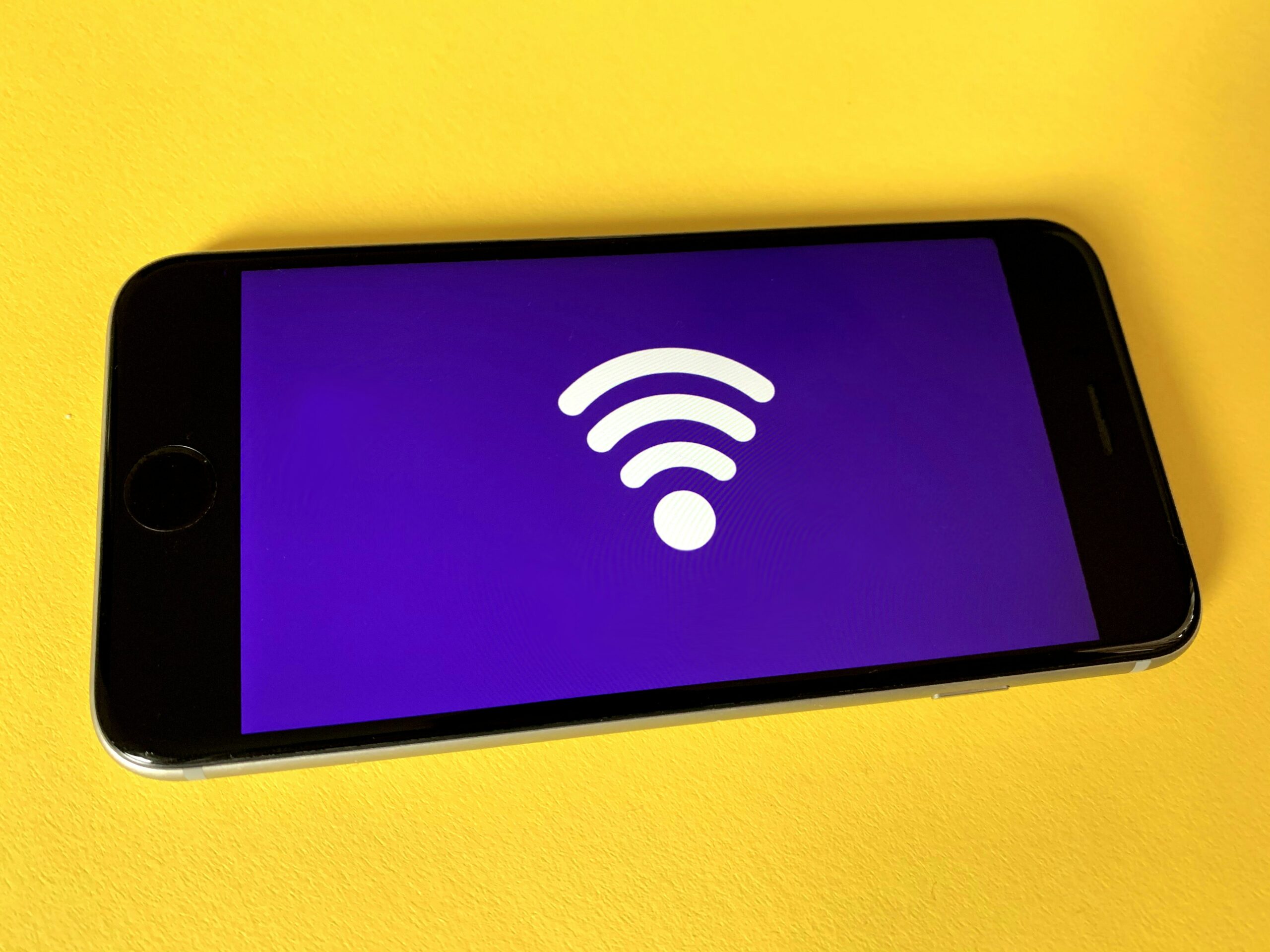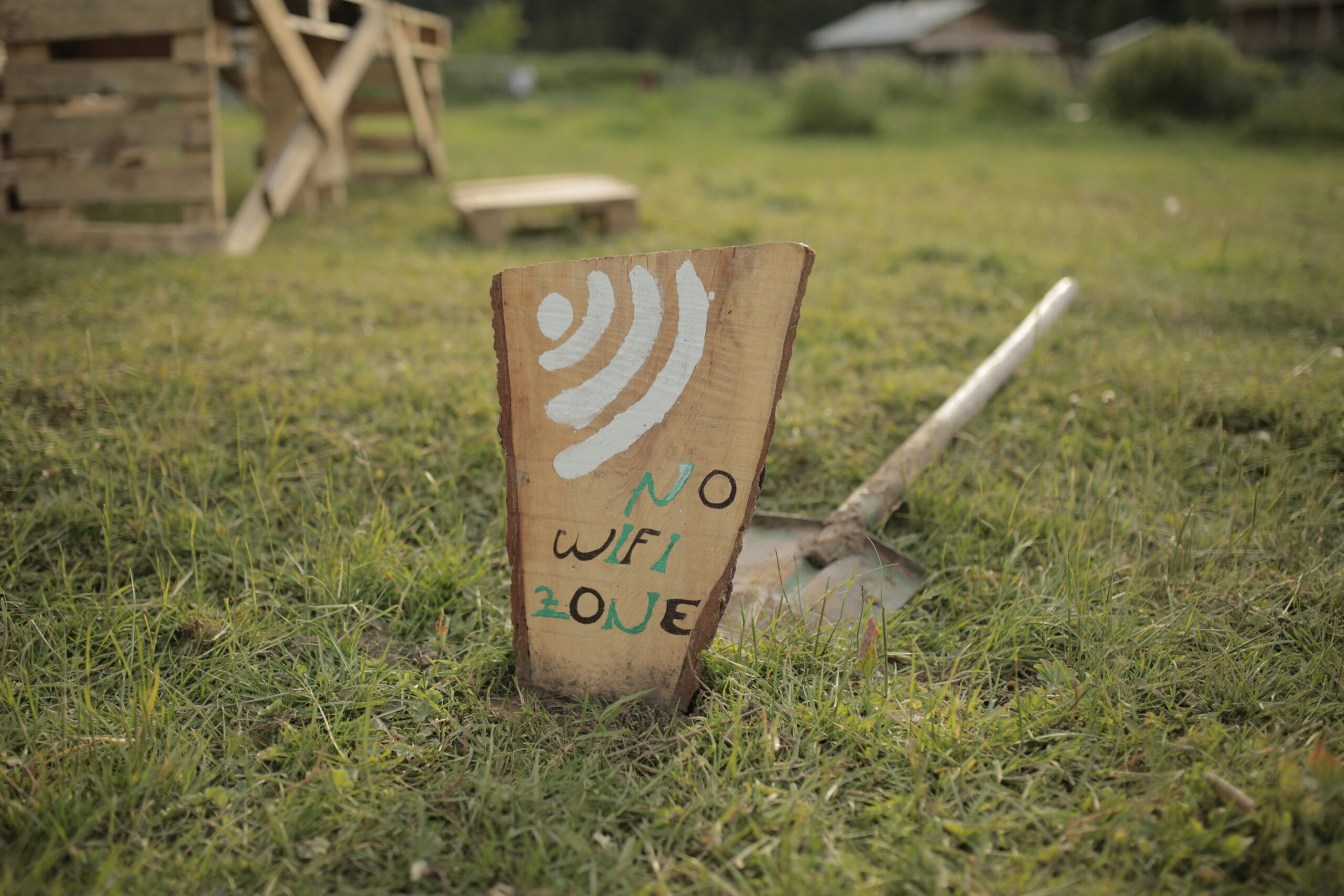On-line harassment is ceaselessly subjective relating to how other folks understand the ugly or offensive behaviors that they come across. Certainly, a notable percentage of American citizens who’ve individually been goals of troubling on-line behaviors would now not label their enjoy as “on-line harassment,” in keeping with a brand new Pew Analysis Heart record.
The Heart’s survey carried out ultimate September measured on-line harassment through asking respondents if they’d individually skilled any of the next: offensive name-calling, functional embarrassment, stalking, bodily threats, sexual harassment and sustained harassment. However in an effort to get a greater figuring out of ways subjective this idea is, goals of those behaviors had been requested in the event that they regarded as their most up-to-date incident to be “on-line harassment.”
Pew Analysis Heart has been learning on-line harassment for years. This actual record makes a speciality of American adults’ reviews and attitudes associated with on-line harassment. For this research, we surveyed 10,093 U.S. adults from Sept. 8 to 13, 2020. Everybody who took section is a member of the Heart’s American Developments Panel (ATP), an internet survey panel this is recruited thru nationwide, random sampling of residential addresses. This manner just about all U.S. adults have a possibility of variety. The survey is weighted to be consultant of the U.S. grownup inhabitants through gender, race, ethnicity, partisan association, training and different classes. Learn extra in regards to the ATP’s technique.
Listed below are the questions used for this record, in conjunction with responses, and its technique.
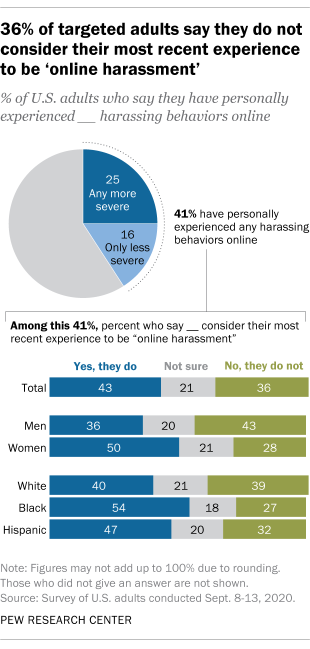
Some 41% of U.S. adults say they’ve ever skilled a minimum of a type of actions and had been classified for our analysis as goals of on-line harassment. But if requested questions on essentially the most contemporary episode they’d encountered, even a few of those that were subjected to the worse varieties of on-line abuse say they wouldn’t classify it as harassment or are undecided it constituted harassment.
Amongst adults who record having skilled a minimum of one harassing habits on-line, kind of four-in-ten (43%) say that they believe their most up-to-date enjoy to be “on-line harassment,” whilst 36% say they wouldn’t classify this enjoy as “on-line harassment.” An extra 21% say they’re undecided.
Girls who’ve skilled harassing behaviors on-line are much more likely than their male opposite numbers to mention they believe their most up-to-date enjoy to be “on-line harassment” (50% vs. 36%). Conversely, a better percentage of guys than ladies who’ve skilled harassing behaviors on-line say they don’t believe their most up-to-date enjoy to be “on-line harassment” (43% vs. 28%).
As well as, Black (54%) and Hispanic adults (47%) who had been goals of on-line harassment are much more likely to label their enjoy as “on-line harassment” than are White goals (40%). Then again, a better percentage of White goals say they don’t see their most up-to-date enjoy as “on-line harassment” when compared with their Black opposite numbers (39% vs. 27%).
The Heart research broke the six harassment behaviors into a number of other teams. Some 38% of those that were focused had ever skilled most effective much less serious issues – offensive name-calling or functional embarrassment – whilst 62% had ever skilled a minimum of one of the vital extra serious varieties of harassment: bodily threats, stalking, sexual harassment or sustained harassment. Of their most up-to-date come across, 34% of goals mentioned they’d encountered this sort of extra serious behaviors, whilst 31% had confronted a couple of behaviors (i.e., greater than one of the vital six behaviors we requested about).
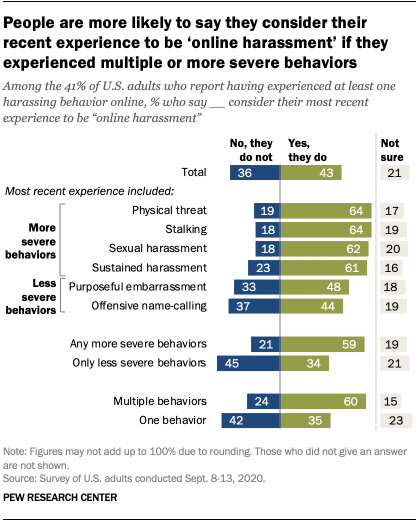
A plurality of people that confronted most effective much less serious harassing behaviors of their most up-to-date come across (45%) say that they’d now not name this enjoy “on-line harassment,” while a minimum of six-in-ten goals of each and every of the worse behaviors say they’d name their enjoy “on-line harassment.” Amongst those that most effective confronted much less serious behaviors of their most up-to-date incident, kind of a 3rd say they believe their enjoy to be “on-line harassment.” This trend is statistically very similar to what was once noticed in 2017.
Whilst individuals who have confronted extra serious varieties of harassment are much more likely to label it as such, there stay notable stocks who aren’t certain how they’d signify the issue they encountered. Kind of a 3rd or extra of those that had been bodily threatened (36%), stalked (36%), sexually burdened (38%) or burdened for a sustained time period (39%) of their most up-to-date come across say they don’t believe this enjoy to be “on-line harassment” or are undecided about calling it this.
Past the kinds of behaviors encountered, the quantity of behaviors concerned additionally performs a task in how other folks label their enjoy. Whilst 35% of people that most effective confronted one form of habits of their most up-to-date come across would name it “on-line harassment,” 60% of adults who confronted a couple of kinds of harassing behaviors of their most up-to-date enjoy would say it was once “on-line harassment.”
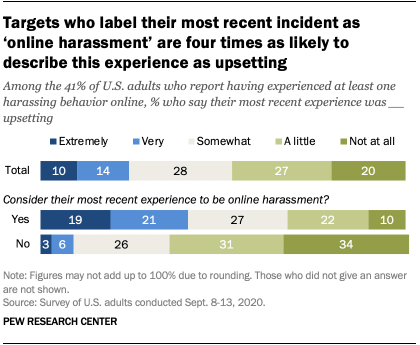
There’s a sturdy dating between the response other folks must their most up-to-date incident and the best way they classify it. Those that don’t signify their most up-to-date episode as harassment also are much less prone to say they had been through what came about. In truth, 65% of those that don’t describe the episode as harassment say their most up-to-date enjoy was once in no way (34%) or somewhat (31%) provoking, whilst 33% of goals who confer with their most up-to-date enjoy as “on-line harassment” say the enjoy was once in no way or somewhat provoking.
Conversely, those that name their enjoy “on-line harassment” are greater than 4 instances as prone to describe that have as very or extraordinarily provoking when compared with those that would now not use that label (40% vs. 9%). Extra pointedly, about one-in-five goals (19%) who name their enjoy “on-line harassment” say their most up-to-date enjoy was once extraordinarily provoking, whilst most effective 3% of those that reject the label of “on-line harassment” say the similar.
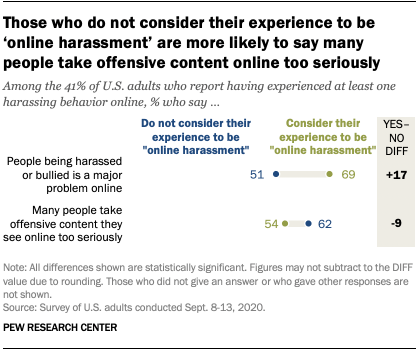
Past their private reviews, those that don’t name their contemporary enjoy “on-line harassment” are much less prone to see on-line harassment as a significant issue. Kind of seven-in-ten other folks (69%) who name their most up-to-date enjoy “on-line harassment” say that harassment is a significant issue on-line, while about part of the ones (51%) who would now not use this classification say the similar – on par with findings from 2017. Those variations in opinion grasp up even if controlling for severity of the harassment, gender and race or ethnicity.
As well as, about six-in-ten goals (62%) who don’t believe their most up-to-date brush with harassing habits to be “on-line harassment” say many of us take offensive content material they see on-line too significantly, when compared with 54% of those that would describe their enjoy on this method. Whilst the trend stays the similar, the variation between those teams has contracted a notable stage since 2017, when there was once a 23 share level hole (73% vs. 50%).
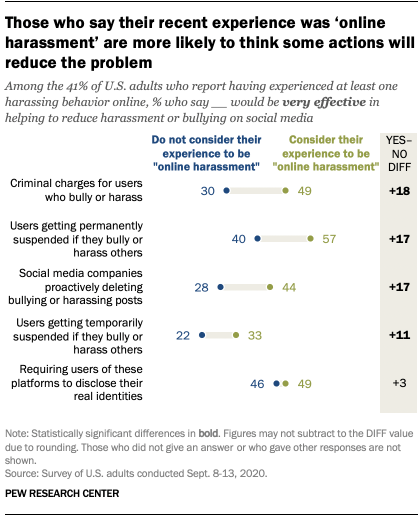
Individuals who would now not name their most up-to-date enjoy “on-line harassment” also are much less constructive in regards to the efficacy of quite a few techniques for combatting harassment on social media. They’re 18 issues much less prone to say felony fees and 17 issues much less prone to say everlasting bans for customers who bully or harass others can be very efficient in serving to to cut back harassment or bullying on social media, when compared with goals who classify their most up-to-date enjoy as “on-line harassment.”
There also are double-digit variations between those that label their on-line reviews as harassment and people who don’t relating to their perspectives in regards to the effectiveness of social media firms proactively deleting bullying or harassing posts and brief bans for customers who bully or harass others. No variations are noticed of their perspectives of the effectiveness of requiring customers of those platforms to divulge their actual identities in curbing harassment.
Word: Listed below are the questions used for this record, in conjunction with responses, and its technique.
Supply Through https://www.pewresearch.org/fact-tank/2021/01/22/some-americans-who-have-been-targeted-by-troubling-behaviors-online-wouldnt-call-it-harassment/
